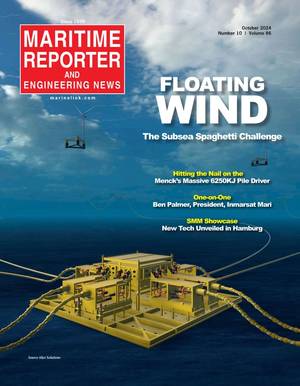On February 19, 2004, the dipper dredge “Rialto M. Christensen” excavated a record 7,800 cubic yards of material in a single eight-hour watch from the bottom of the Panama Canal, working on the Gatun Lake deepening project. The original record was set nearly a century ago, when, in February of 1916, the dipper dredge “Cascadas” excavated 7,770 cubic yards of material. Steam-powered, the Cascadas arrived to Panama in 1915 from Camden, New Jersey, beginning dredging operations that year on October 31, including removal of material in the Gaillard Cut. The record set by the Cascadas had not been broken or matched for 88 years – until this February.
The Christensen arrived in Panama from Hokodate, Japan, in September of 1977.
At 15 cubic-yards, the diesel electric dipper dredge is the largest of its kind in the world.
An essential component to widening the Gaillard Cut, the Christensen has several other important functions, including: maintaining the navigable design depths of the channel and removing shoals and landslides that present hazards to the safe navigation of transiting vessels.
Dipper dredges, equipped with a power-driven ladder structure and operated from a barge-type hull, aided in the original construction of the Canal across the Isthmus of Panama. From removing silt and debris to widening the Canal and to ensuring the safe transit of vessels, dredges have been instrumental to constructing the Canal.
“Our Dredging Division is world-class. Everyday I am impressed with their tenacity, skill and motivation,” said Dredge Captain Peter Marotta. “They are largely the reason why the Canal is operating at its safest, fastest and most efficient levels. Our employees are truly the Canal’s most valuable resource,” added Marotta.
The accomplishment of the Christensen and other recent improvements at the Canal are results of the ACP’s permanent modernization program, enhancing the efficiency and reliability of the Canal, while ensuring the safety of transiting ships.
Featured videos

Taking the First Step Toward Autonomy

Send in the Drones (to deep, dark, confined maritime spaces)
October 2024
 Read the Magazine
Read the Magazine

 Read the Magazine
Read the Magazine
This issue sponsored by:

Svendborg Brakes' Yaw Brake Solution Transforms Wind Turbine Maintenance
Subscribe for
Maritime Reporter E-News
Maritime Reporter E-News is the maritime industry's largest circulation and most authoritative ENews Service, delivered to your Email five times per week









